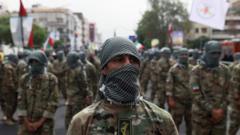In a significant ruling, a Tokyo court has ordered the dissolution of the Japanese branch of the Unification Church, reflecting a broader examination of the group's activities that intensified following the tragic assassination of Shinzo Abe in 2022. The court's decision arrived after an investigation uncovered that the controversial religious organization, widely criticized for its financial demands on followers, had manipulated members into accruing substantial debts to support political affiliates, including conservative leaders.
**Japanese Court Orders Disbandment of Unification Church Following Abe Assassination**

**Japanese Court Orders Disbandment of Unification Church Following Abe Assassination**
A landmark ruling from a Tokyo court comes three years after the assassination of former Prime Minister Shinzo Abe, which exposed troubling practices within the Unification Church.
The investigation was prompted by the profound implications of Abe’s death, when the accused assassin, Tetsuya Yamagami, reportedly claimed that the church had forced his family into financial ruin. This assertion shed light on the extensive pressure placed upon members to donate funds and purchase religious materials, leading the Japanese government to intervene. The education ministry, which oversees religious organizations, made a formal request for the church's disbandment in October 2023, citing testimonies from roughly 1,550 former members who reported losses amounting to approximately 20.4 billion yen (around $140 million).
This ruling represents a rare and severe judicial action against a religious entity in Japan, raising pressing questions about the nature of religious freedoms and the responsibilities of faith organizations towards their followers. The Unification Church, founded in South Korea by Rev. Sun Myung Moon, has been similarly scrutinized in various countries and continues to maintain a global presence despite ongoing controversies.
The aftermath of Abe's assassination has ignited intense national discourse about the intersections of politics and religion in Japan, prompting a reevaluation of the legal frameworks governing religious institutions and their influence on public life. As the legal proceedings against Yamagami are ongoing, this shocking case could signal a turning point in Japan's approach to potentially exploitative religious groups.
This ruling represents a rare and severe judicial action against a religious entity in Japan, raising pressing questions about the nature of religious freedoms and the responsibilities of faith organizations towards their followers. The Unification Church, founded in South Korea by Rev. Sun Myung Moon, has been similarly scrutinized in various countries and continues to maintain a global presence despite ongoing controversies.
The aftermath of Abe's assassination has ignited intense national discourse about the intersections of politics and religion in Japan, prompting a reevaluation of the legal frameworks governing religious institutions and their influence on public life. As the legal proceedings against Yamagami are ongoing, this shocking case could signal a turning point in Japan's approach to potentially exploitative religious groups.



















